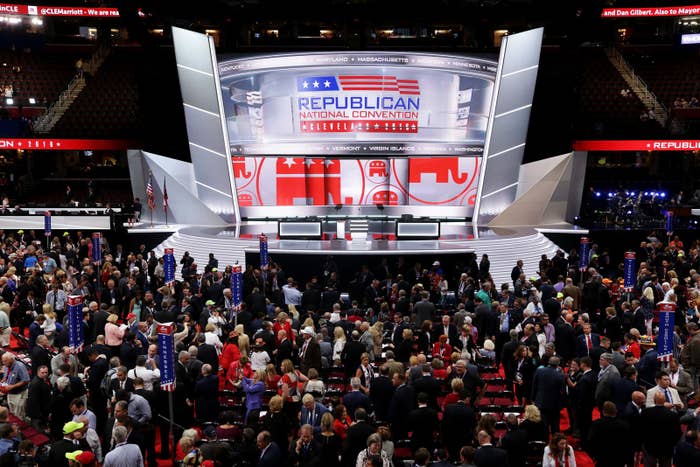
The Republican Party wants the next president and Congress to resolve the nation's encryption debate. How, exactly, the GOP might go about accomplishing that remains a mystery, but in the Party's platform document released Monday, Republicans nodded to a contentious and ongoing policy dispute pitting law enforcement officials against much of Silicon Valley — one likely to shape the right of private citizens to communicate without government interference.
Echoing officials from the Justice Department and FBI under Obama, the GOP framed the widespread use of secure communication tools as part of a novel security dilemma. The privacy protections offered by encryption "have become crucial to the digital economy," the Party said. But, at the same time, "such innovations have brought new dangers, especially from criminals and terrorists
who seek to use encryption technology to harm us."
The GOP's non-committal stance on encryption also reveals tensions between the party and its candidate, Donald Trump, who called for a boycott of Apple in February as the company battled the FBI in court over an encrypted iPhone used by one of the San Bernardino shooters. "Boycott all Apple products until such time as Apple gives cellphone info to authorities regarding radical Islamic terrorist couple from Cal," Trump tweeted.
Encryption tools help us communicate securely by preventing other people from reading our messages and stored information, and are offered through popular messaging apps like Apple's iMessage, and WhatsApp. Google's new messaging platform Allo and Facebook's Messenger will soon offer robust, easy to use encryption tools as well.
The GOP's non-committal stance on encryption also reveals tensions between the party and its candidate, Donald Trump, who called for a boycott of Apple in February as the company battled the FBI in court over an encrypted iPhone used by one of the San Bernardino shooters.
In what has become characteristic of encryption policy discussions in Washington, the GOP acknowledged the unbending positions in the debate, while still envisioning a path forward.
"This issue is too important to be left to the courts," the GOP platform says of encryption. "A Republican president and a Republican Congress must listen to the American people and forge a consensus solution."
Riana Pfefferkorn, the cryptography fellow at Stanford’s Center for Internet and Society, told BuzzFeed News that it's become standard for both parties to talk about a balance between privacy and law enforcement needs, without taking a real position on encryption.
"The most troublesome part of this is where it seems to characterize encryption as being, in and of itself, a weapon that can be used 'to harm us,'" she said. "Given the crucial role of strong encryption in the modern economy, calling encryption a 'weapon' is a framing we can't afford to return to."
If the GOP's evasive, middle of the road approach sounds familiar, it may be because Hillary Clinton offered something similar, when asked about the Apple-FBI-litigation earlier this year.
"We don’t want privacy and encryption destroyed,” she said during a town hall discussion with Bernie Sanders in February, adding that, as president, she would bring together government agencies and technology companies to forge a creative solution.
In the Spring, the Justice Department tried to convince a judge to force Apple to design new software that would grant investigators special access into a locked iPhone used by the San Bernardino shooter. While the high-profile case eventually dissolved, after the FBI was able to get inside the device without Apple's help, the deeper legal issues remain unsettled.
A meaningful solution may prove elusive, however, considering recent efforts in Washington to tackle encryption. A long-awaited bipartisan bill that would have forced tech firms to provide law enforcement special access into customers' communications was outright rejected by technologists and privacy advocates as unworkable and dangerous. The only moves on Capitol Hill that have garnered widespread approval have been initiatives to study the encryption debate further.
Law enforcement officials insist that the widespread use of encryption poses a national security risk. But cryptologists, tech industry leaders, and privacy advocates argue that any government mandate to weaken or alter encryption standards would jeopardize US economic interests and undermine the security of the Web.
Acknowledging what has been up to this point an intractable disagreement, the Republican Party's platform states "It will not be easy to balance privacy rights with the government’s legitimate need to access encrypted information."
